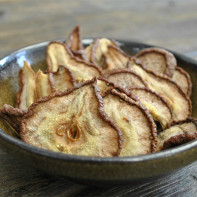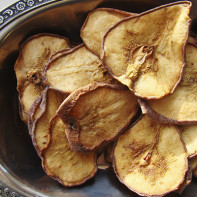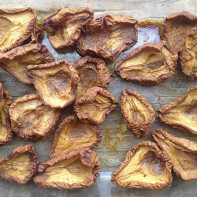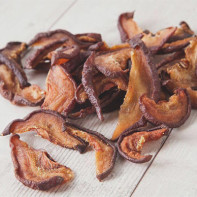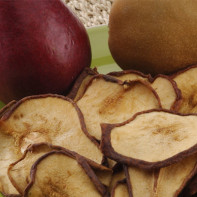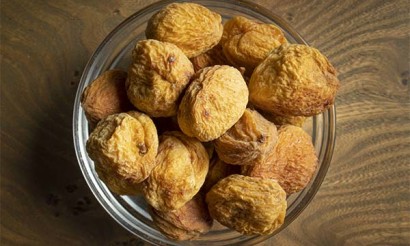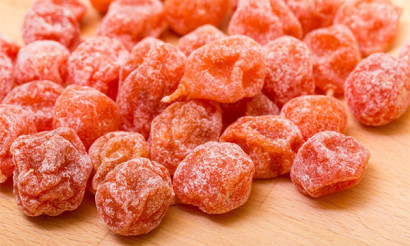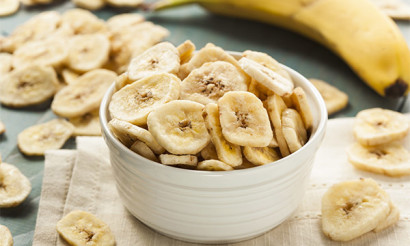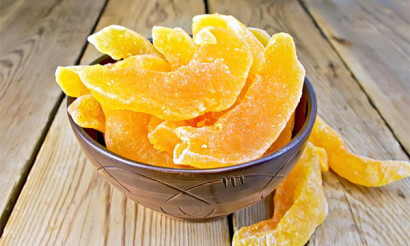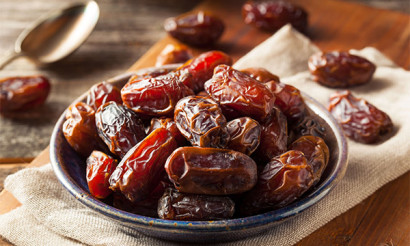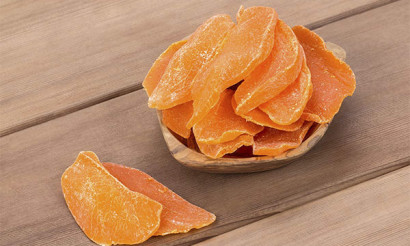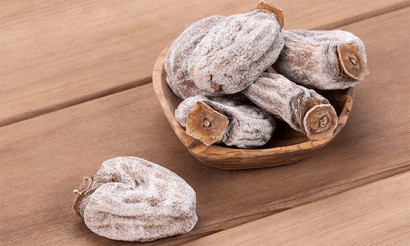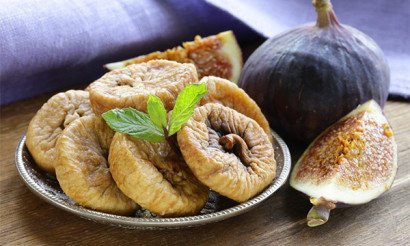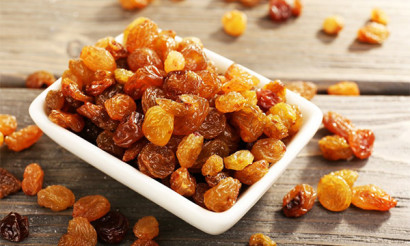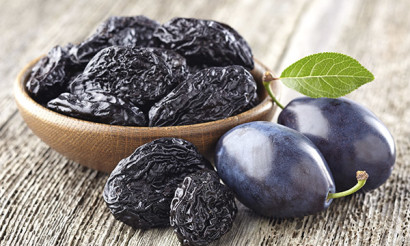Dried pears: useful properties and contraindications
The pear itself is a delicious, juicy and valuable fruit. Few people know that it has beneficial effects on the heart, rejuvenates the skin, is a powerful immunomodulator and has many benefits for humans.
An abundance of fruit in summer is always a joy, but in winter, useful home pears are constantly in short supply. To preserve the harvest, people dry and store them. And with proper storage nothing will happen to the fruits, so you can at any time please yourself with a pear, jam, compote, etc.
Composition and calories
Drying the fruit at a moderate temperature preserves in the pear all the vitamins and useful properties, which are sufficient in any variety. Therefore, many people who prefer to regularly consume dried fruit, enjoy the taste and strengthen their bodies at the same time.
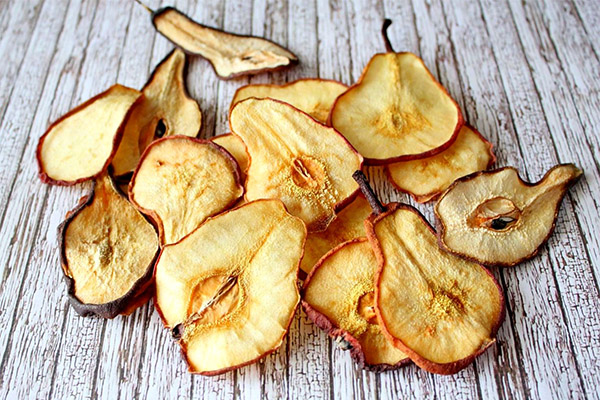
Composition:
- calories - 249;
- proteins - 2.3 g;
- fats - 0.6 g;
- carbohydrates - 62.6 g;
- dietary fiber - 6 g;
- water - 24 g.
Dried pear is rich in trace elements, phytoncides, flavonoids, sugars, fiber, iodine, organic acids and enzymes. A lot in the chemical composition of vitamins, including provitamin A, C, group B, K, P, PP. Potassium, calcium, magnesium, phosphorus, iron, manganese and copper are most abundant in pears.
A pear seems sweeter than an apple, but it actually has even less sugar. The dried fruit is included in many diets because of its low energy value. It has little protein, but quite a lot of carbohydrates.
However, it should be remembered that 100 grams of the product contains 12% of the daily calories, so diabetics and people who watch their figure should take this into account when drawing up their diet.
Useful properties of dried pears
The product not only has a pleasant taste, but also very useful. In dried pears there are relatively few calories and a lot of carbohydrates, which give energy to the body. There is little sugar, but the fruit remains naturally sweet. Therefore, many physicians and nutritionists advise consuming both fresh and dried pears.
Pay attention! If the dried fruit is dried correctly, the set of minerals and vitamins is preserved.
100 g of dried pears contains 37% of the daily requirement of copper, potassium (35%), magnesium (16%), manganese (16%), vitamin K (17%), phosphorus (11%), calcium (10%), iron (10%) and vitamin C (9%). Accordingly, the inclusion of the product in the daily diet will make up for the lack of nutrients.
Useful properties:
- Dried fruit is believed to act as a diuretic and disinfectant, normalize many functions and treat the pancreas. Dried fruit helps to cleanse the body of heavy metals and removes toxins.
- Usually, from the product is brewed compote, which contains tannin, which is useful in intestinal disorders (binding effect in diarrhea), and antibacterial properties of the drink help in the treatment of colds and sore throats.
- The abundance of potassium makes dried fruit an aid in normalizing the cardiovascular system, strengthening capillaries and blood composition.
- In case of rapid fatigue, loss of appetite and mood you should include dried pears in your diet. They are also useful for arrhythmia and regular dizziness. The reason is the high content of iron, because of the deficiency of which the problems described above appear. For the same reason, the pear helps with poor tissue healing. There is even a folk recipe, when the product is consumed by people, if they often have cracks in the corners of the mouth.
- B vitamins help strengthen and restore muscles, normalize the nervous system, as a result of which a person's overall mood improves. Strengthened and the bones because of the calcium content in pears. More B vitamins are useful for hair, improve their growth and condition.
- There is a large amount of vitamin C and folic acid. The vitamin strengthens the immune system, protects the body from viruses, favorably affects the synthesis of some hormones, in general is a powerful antioxidant, improves thyroid and pancreatic functions. Also vitamin C slows aging and removes toxins in alcoholics.
- Since the product eliminates toxins, dried fruit compote helps with hangovers. It is also believed that the daily consumption of pears increases performance.
Dried pears in medicine
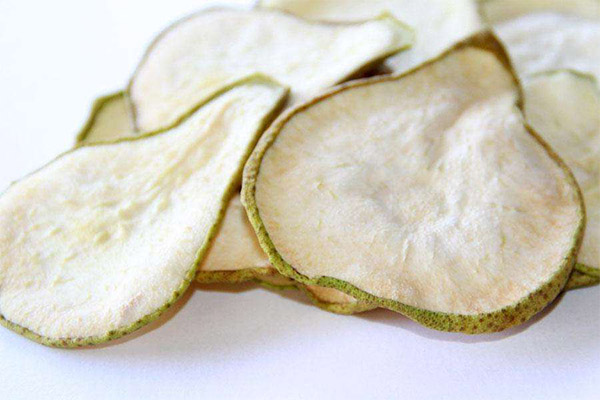
Dried pears are mostly used in folk medicine. Namely:
- in case of high fever;
- as a diuretic;
- As a general tonic;
- against coughs.
The product is used for inflammatory processes in the kidneys and bladder, to restore the acidity of gastric juice, to suppress germs in the intestines. And there are actually no special recipes. You just need to regularly consume dried fruits themselves or a rich compote made from them.
Dried pears are also popularly used to treat:
- insomnia;
- obesity;
- colds and coughs;
- high cholesterol;
- fatigue;
- digestive disorders;
- depression;
- heart problems;
- nervous system disorders;
- headache.
Harm and contraindications
The benefits of dried pears are undoubtedly a lot, but there are also harms. Although there are not many calories, but they are a priori, so you should not abuse, eating a lot of dried fruit every day. Especially diabetics should think about it.
Products high in fiber should not be consumed by people with stomach ulcers. And there is enough fiber in dried pears.
In general, dried fruits are hypoallergenic, but individual intolerance can be. Most often, the allergy to dried pears is found in people with an allergy to birch and alder. But such people are very few.
How to store dried pears
The proper storage of dried fruit depends on the preservation of both the product itself and its useful properties. Store the finished slices in a sealed airtight container, whether it is a glass or a tin can. The main thing is that it should be tightly closed. You can also use plastic bags with a clasp.
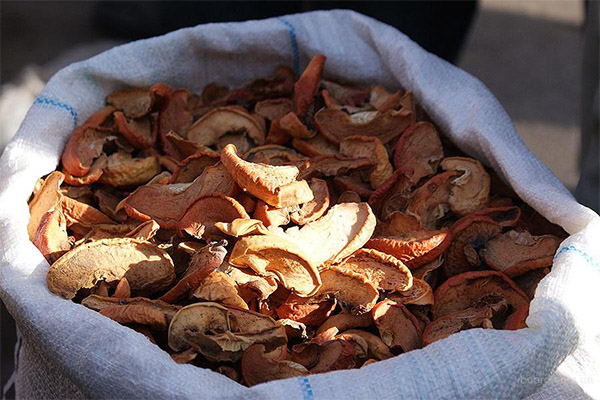
Pears should be stored in a cool and preferably dark place. A room with ventilation, low humidity and a temperature within +10 degrees is perfect. Dried fruits perfectly absorb extraneous odors, so there should not be particularly fragrant products (fish, spices, etc.). You should not put the container on the floor.
Contingencies cannot be excluded. And if insects somehow got inside the container, you can try to fix the situation. It may turn out that pests noticed in time did not have time to spoil the product. You need to sort out the pears, throw out the spoiled slices, put the rest back on the tray and dry in the oven for half an hour at a temperature of 60 degrees. Another enemy is mold. If the dried fruit is affected by fungus, it is better to throw everything away.
In a suitable place, under optimal conditions and in an airtight container, dried fruit can be stored for up to a year. If they lie just in the apartment, because of the high temperature and humidity, the bacteria will quickly multiply, and already in 2-4 weeks the pear will be covered with mold.
How to dry pears at home
Anyone can successfully make dried fruit from pears at home. Usually use slightly unripe fruits with dense flesh, but not very juicy. It is better not to use "astringent" in the mouth varieties with lots of seeds. Sweet summer varieties will do well: Ilyinka, Lesnaya beauty, Aromatnaya, Limonka, Zaporozhskaya.
Pick medium-sized fruits, wash and boil them. Everyone does the drying in their own way, but many people shred the pear by first cutting it into 4 pieces to remove the seeds and then into slices. The product is then soaked in wine vinegar (1%) to avoid further darkening.
Do not store pears more than 2 days before drying, otherwise they will no longer be suitable. Before drying, it is necessary to scald the fruit a little, throwing them for a while in boiling water. You can add sugar to a pan of boiling water, if you wish.
After 10-15 minutes of boiling, take out the fruit, let it cool, and then, if necessary, cut into slices. Next, the slices are dried. It is at this stage it is advisable to treat them with wine vinegar.
There are several ways of drying:
- natural method;
- oven;
- a special electric dryer;
- microwave oven.
In warm regions of the country you can dry pears in early autumn without any problems. This is especially important, because the longer the pear has ripened or lay, the more useful substances have accumulated in it. People who live in private homes simply leave the fruit on the roof all day.
But even in colder regions it is possible to cook dried fruit, since almost everyone has a microwave oven or at least an oven.
In the natural method, the slices are spread out on a sieve (tray, tray) and left in the sun so that no dust gets on them. When the sun goes down, the pears are covered with plastic and brought home. After a couple of days of drying, the fruits are laid out in a shaded place for 3 days to finish drying, periodically turning them over.
If there is an oven, drying is carried out directly in the kitchen. Slices are spread out on a baking tray and dried for 2 hours at a temperature of 55-60 degrees. Then increase the temperature by 20 degrees. So whole fruits should be dried for about a day (12-16 hours, if it is slices).
There are special electric dryers with trays and autonomous work: uniform automatic circulation of warm air. It is very convenient, you just need to put the fruit on a tray and wait for the end result.
The fastest drying process is in the microwave oven. In a few minutes the portion is ready, but there is a risk of miscalculating and over-drying the product. There is no exact recipe, as it all depends on the power of the oven. You should start with drying for 2.5 minutes at 200 watts. If this is not enough, the process is repeated for 30 seconds. When the slices have become elastic and springy, you're done.
Some people prefer to dry pears whole without dividing them into slices. The process is completely similar, and the only difference is the time. It makes sense to dry the fruit whole if the fruit is small in size. Keep the whole fruits in the sun will have to about a week.
In the oven, whole pears will be ready in about 20 hours with constant turning. You should dry them until the fruits turn brown. With good ventilation, the dried fruit will be ready in 8-10 hours.
Wild pears can also be successfully dried at home. But the rule must be observed: you must not pluck the fruit from the trees. You should collect the fallen pears, put them in a container (let's say, in a bucket) and let them rest. Readiness for drying is determined by taste and color. When the fruit has become fragrant-sweet, and its skin brown, it is time to make dried fruit.
How to make dried pear compote
Dried fruits are eaten as they are, but more often they are used to make a delicious compote. The recipe for the classic compote from dried pears is simple.
The following components are required:
- dried fruits - 200 g;
- sugar - 100 gr;
- citric acid - 1 g;
- water - 1 l.
Preparation will take about half an hour, and the result will be compote for 4 portions. You should thoroughly rinse the dried fruits in boiling water and put them in a saucepan. All pour a liter of water, cover with a lid, bring to a boil and cook on low heat for about 30-35 minutes.
Then add sugar and citric acid, stir everything, and then cool. The compote turns out delicious and rich.
Interesting facts about pears
Everyone ate delicious, juicy pears, but few people know interesting facts about them:
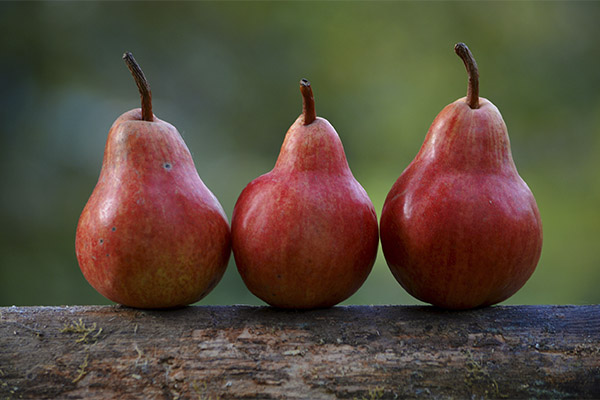
- Pears originated in South Asia. In Europe the fruit came before our era, but in America relatively recently - 400 years ago.
- The ancient Greeks believed that pears were a gift from the gods, and thanked them by bringing the fruit as a gift to Aphrodite.
- The pear and the rose are related, as both plants are rosaceous. Also pear is sister to hawthorn.
- The ancient Chinese considered the pear a symbol of immortality because of its durability. And now its wood is used to make furniture, musical instruments, kitchen appliances, etc.
- Until Columbus brought tobacco to the continent, the local Indians smoked dried pear leaves.
- An interesting fact is that the leaves on the branch grow at a certain angle: each leaf is 135 degrees apart. This way the plant gets maximum moisture and sunlight.
- If you eat fresh pears regularly, your teeth will become noticeably stronger because of their high calcium and phosphorus content.
- The fruit does not cause allergies. The percentage of allergic people who have a reaction to pears is negligible.
- In Japan, they grew the largest pear fruit, which weighed 3 kilograms.
- The fruit is a natural antiseptic. Gastroenterologists even recommend consuming pears separately from meals to get rid of harmful microorganisms in the intestines.
Dried pears should be stocked for everyone whenever possible. And this is not about fresh compote from a natural product in the winter, but the fact that dried pears strengthen the body, protects against bacteria, removes harmful substances, and has a lot of vitamins and useful compounds.
«Important: All information on this site is provided solely for introductory purposes. Before applying any recommendations, consult a health care professional. specialist. Neither the editors nor the authors shall be liable for any possible harm caused by materials."

